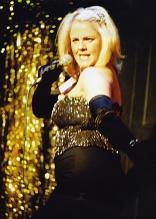The Ho-Ho Club
Making people laugh seems an appealingly simple way of earning a living. Well, it is if you're funny, I suppose. But life isn't all laughs for those who continually tread the boards at comedy clubs and venues up and down the country. Having to face chillingly hostile audiences is only one of the trials comedians have to cope with, as this piece from Roy Smiles tries to explain.
'The Ho-Ho Club' is set in a comedy venue in South London that's owned by Dave Harper (played by Roger Kitter). Harper rules his club with a rod of cynical and unscrupulous iron. He's a man with little in the way of virtue, and a management style that Attila The Hun might deplore. We meet him first as he fires gags at the audience in his club, and we immediately recognise a man who will do anything to get a laugh and make a few quid. The rest of the cast comprise the comedians who are appearing at Dave's club as well as Harry, the club's general dogsbody who has the thankless task of dealing with events such as toilets blocked by 'a turd the size of a dolphin'. The action takes place in the artists' seedy dressing room, and we also catch some of the acts as they do their turns on stage.
Most of the characters know each other from previous encounters on the circuit, and some of their intimate history is revealed. For example, Tony Watts (played by Stephen Dean) has a 'thing' for the star of the show, Linda Walsh, whose long-suffering husband/ manager is near to breaking point as the outsider in this closely-knit and fraught comedic world. There's also a newcomer on the scene, Debbie Thomas (played by Katy-Jo Howman) who's told by the owner before she goes on stage: 'If you believe in god, now's the time to start praying'.
The gags which stream from the mouths of the comedians who feature in 'The Ho-Ho Club' certainly have the power to make one laugh, even if some of them fall on the wrong side of the good taste divide. But then that's part of this concept, which is not intended to be politically correct, but to portray the gritty reality of life on the comedy circuit. There are some good one-liners - many of the first night celeb's laughed long and hard, even if it took a moment or two for the penny to drop on occasions. But the gags are just that - crafted and contrived devices which, though funny, don't leave a lasting impression, and there's never a sense that they will overwhelm us with uncontrollable laughter as one might experience in a real comedy venue with first rate performers.
Top of the bill in this production is Sally Lindsay, formerly landlady of the Rovers Return in 'Coronation Street', who plays comedienne Linda Walsh. Her character here has much in common with her former role in the 'Street' because she's meant to hail from Bolton which is a stone's throw from the setting for the long running TV soap. Lindsay's character here is an earthy, forceful and experienced performer, respected by her colleagues and with a nice line in self put-downs - when she appears on stage in the club, she says "Like me frock? .... Christian Dior ... (pause) ... threw up when he saw this!" Lindsay's performance is solid and professionally convincing, but best in the acting department was Billy Miller, who plays Linda's husband Stan. His part is a kind of role reversal, and Miller made the most of it, turning in a believable portrayal which brought an element of realistic normality to the piece.
Overall, the dramatic force of the play was rather weak and gave the feeling that we had all somehow been down this road before. And for the first half of the play I was left wondering just where we were being taken and for what purpose. In the end, I'm not sure we learned anything from the interactions of the characters other than the fact that professional comedians might not be the nicest bunch of people to spend a few hours with.
The problem with a show like this is that when the characters continually fire gags at each other with almost carefree abandon, it's hard to care for them or to take them seriously when the mood shifts. So, the overall result is something of a let-down, which disappears from memory almost as suddenly as one steps onto the pavement outside the theatre. I certainly didn't feel any empathy or sympathy for the characters. Maybe that's because anyone who puts themselves up as a comedian doesn't immediately strike us as being deserving of sympathy. And that might be one of the points which Smiles is trying to make. If that's the case, we needed rather more in the way of character development and fewer jokes in order to convince us.
(Peter Brown)
Originally published on
